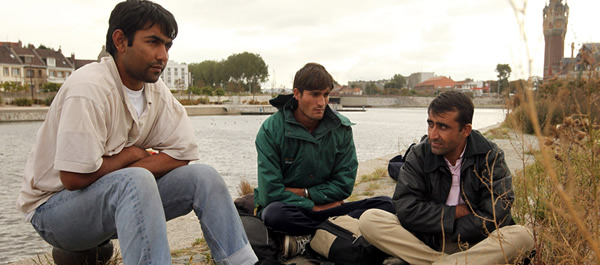A statement on the situation in Calais
A joint statement on the situation in Calais from the Baptist Union of Great Britain, the Church of Scotland, the Methodist Church and the United Reformed Church

Dr Jill Barber
Vice-President of the Methodist Conference
The Revd Lynn Green
General Secretary of the Baptist Union of Great Britain
The Revd David Grosch-Miller
Moderator of the General Assembly of the United Reformed Church
The Rt Revd Angus Morrison
Moderator of the General Assembly of the Church of Scotland
The Revd Steve Wild
President of the Methodist Conference
As churches with members directly involved in assisting the people in Calais seeking sanctuary in the UK, we believe it is important that public debate is grounded in values of compassion and that decisions are made on the basis of facts. In recent weeks discussion has increasingly appeared to be based on the principle of self-interest. Our faith instructs us not to fear the stranger, but to love our neighbour. We view the situation with growing alarm and anger.
We are compelled to speak out on this issue. As Christian churches we follow One who was himself a refugee and who demonstrated that all people have an inherent, God-given dignity.
Our Scriptures teach the importance of love and compassion for all who are destitute, including people of other nationalities who come to live in our communities.
We do not speak out as detached, comfortable observers but as leaders of churches who are actively ministering to those involved. In east Kent our churches have publicly offered practical support and help to teenage asylum seekers due to be housed in their town. Through our international links with Baptists in France, we are also supporting work amongst unaccompanied children in Calais. St Andrews Scots Church in Malta, a joint Methodist-Church of Scotland congregation in Valletta, runs the Out of Africa into Malta project to assist migrants. However we cannot play our part effectively without a political backdrop that seeks a sustainable and just solution in the longer term.
And we stand in solidarity with the remarks made recently by the Rt Rev Trevor Willmott, the Bishop of Dover, the Jewish Council for Racial Equality and in support of the pioneering work of the Churches’ Commission for Migrants in Europe.
We welcome the affirmation by the Home Secretary that Europe will ‘always provide protection for those genuinely fleeing conflict or persecution’.
However, the language in which the Calais situation is being discussed tends too often to demonise, denigrate or dehumanise the individuals seeking refuge in Britain.
To talk of those gathering at Calais as a ‘swarm’, or ‘marauding around the area’ encourages people to see those in desperation as less than human, and so less deserving of sympathy, respect or dignity. To incite fear that by offering the hand of friendship and welcome we may damage our own standard of living implies that British lives and well-being are somehow more valuable than those of others.
We share the concern of all involved to see a peaceful and humane solution to this particular expression of a far broader catastrophe. While we recognise the need for security to be increased at Calais, to better ensure the safety of all involved, we cannot see that more guards, sniffer dogs and fencing will alone bring such a solution.
We therefore call on the Government to promote a more informed and higher level of debate on the issue – one which acknowledges, for example, that:
-
many of the migrants congregating at Calais are people genuinely fleeing repression who have real stories of suffering and hardship to tell – and that some are unaccompanied children;
-
the numbers involved do not warrant talk of an ‘invasion’ or ‘flood’ of migrants;
-
the people at Calais represent a tiny fraction of the overall number of migrants who have entered the EU in the past year
-
in 2014 Germany took three times more asylum seekers than the UK's 14,000, and Sweden twice as many; France, Italy and even Switzerland also granted asylum to more people than the UK;
-
the disruption caused to travellers is also a consequence of issues unconnected with the situation in Calais, including industrial action by ferry workers;
-
historically the UK has welcomed people fleeing persecution, including Jews escaping from Germany during the Second World War;
-
the UK has been militarily involved in some of the situations that have given rise to the persecutions from which people are fleeing;
-
contributions to this debate should always adopt language which better reflects the British values of compassion, hospitality and respect for human dignity.
We also call on the Government, in its response to this emergency, to:
-
recognise that most migrants cannot be returned to their country of origin: in many cases it is not even possible to be certain of an individual’s country of origin due to a lack of documentation;
-
promote the establishment of proper, EU-run processing centres at key entry points in Europe (such as southern Italy and Greece);
-
accept the need for the UK to take its share of migrants as other European countries are already doing.
And we ask all our congregations and members to respond to an urgent call to prayer, to remember in our churches the importance and equal value God places on every human life, and to seek wisdom that we can challenge injustice and work for peace for the whole world. Let us seek direction and discernment for ourselves and for our leaders for solutions to this ongoing crisis, for the sake of all peoples.
14/08/2015